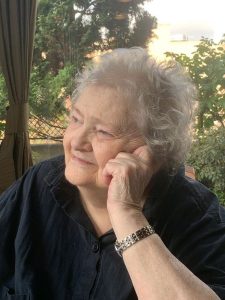In Memoriam: Brenda Dervin

ASIS&T mourns the passing of Brenda Dervin, a stalwart of the information science and communication fields. She died in Seattle on December 31, 2022. She was 85. She has been described as “a mentor”, “a rockstar”, “force of nature”, “an inspiration”, and “indomitable”.
Brenda Dervin was Professor Emeritus of Communication at Ohio State University. Professor Dervin received a Bachelor of Science degree in journalism and home economics from Cornell University, with a minor in philosophy of religion, and had M.A. and Ph.D. degrees in communication research from Michigan State University. She was awarded an honorary doctorate in political science by the University of Helsinki. Professor Dervin was a Fellow of the International Communication Association and served as its first female president from 1985 to 1987. She is famous for her work in the fields of communication and library and information science, best known for her Sense-Making Theory and Methodology, which has been widely adopted and applied by researchers across disciplines. A frequently-cited author, she has more than 17,000 citations on Google scholar. In 2006, she received the 'Research in Information Science' award from ASIS&T, which recognizes an individual who has made an outstanding contribution to information science research.
Barbara Wildemuth, Professor Emeritus, School of Information & Library Science, University of North Carolina at Chapel Hill writes, “Brenda was one of the first to push the field of information behavior research toward a more user-centered perspective and so had a profound on the entire discipline of information science. Her development of Sensemaking Theory and Methodology provided the tools needed for many of us to pursue studies of people's information-related thinking and behaviors. We would not be where we are today without her contributions.”
Sanda Erdelez, Professor and Interim Dean, College of Organizational, Computational, and Information Sciences, Simmons University writes, “Library and Information Science (LIS) and especially the field of human information behavior (HIB) research has lost an icon. Brenda Dervin was an outsider to LIS, a communication scholar with a perceptive and inquisitive mind. She urged HIB researchers to shift focus from information systems to the gaps people (insert a squiggly character here) experience as they progress through their life situations. Her theoretical and methodological innovations opened the doors for deeper understanding of people and information and will continue to inspire generations of HIB researchers to come.”
Naresh Agarwal, Immediate Past President of ASIS&T and Professor & IS&T Director, School of Library & Information Science, Simmons University writes, “I have been among the countless researchers who have been enamored by the research and writings of Brenda Dervin right since my Ph.D. days in Singapore. She identified herself as a reviewer in an early manuscript I submitted, ‘I used Dervin above as my example because, of course, as you may guess I am Dervin’. I tried to make sense of Sense Making in my own research and writing. I saw in Dervin a philosophical and intellectual mentor and identified with her. In 2021 and early 2022, I had the pleasure to have in-depth conversations with her about her personal life and academic career. The video recordings are available on the Project Oneness World website.”
Christine Urquhart, Senior Lecturer Emeritus, Department of Information Studies, Aberystwyth University, UK writes, “Sense-making as a concept is not confined to information science and communication studies - the term is used in many disciplines, as ‘making sense’ is a universal phenomenon whether you are a science teacher, a reference librarian, a UX expert, or a member of staff coping with innovation and change in your organisation. Brenda's contributions on ways of ‘doing sense-making’, thinking dialogically, will continue to be taken up by many within and outside information science. Our own contribution to this process should be to ensure that Brenda's unique vision is appreciated and used within other disciplines. Sense-making will surely continue and develop.”
Many of her doctoral students in communication studies kept in contact with her long after their graduation. She became a friend and mentor to many other doctoral students who consulted her for advice on sense-making methodology. Whatever their background, they often realized that sense-making methods could be applied in the workplace, and more than ever it seems, we need that ‘disciplined dialogue’ to listen with empathy to others.
You can share your memory of Brenda Dervin and the influence of Sense-Making on your work here.
